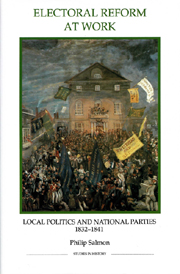Book contents
- Frontmatter
- Contents
- List of illustrations
- List of figures
- List of tables
- Dedication
- Acknowledgements
- Abbreviations
- Introduction
- PART I THE REFORMED ELECTORAL SYSTEM
- PART II THE COUNTIES
- PART III THE BOROUGHS
- 6 No representation without taxation: rates and votes
- 7 The electoral politics of municipal reform
- Conclusion
- Appendices
- Bibliography
- Index
6 - No representation without taxation: rates and votes
from PART III - THE BOROUGHS
Published online by Cambridge University Press: 12 September 2012
- Frontmatter
- Contents
- List of illustrations
- List of figures
- List of tables
- Dedication
- Acknowledgements
- Abbreviations
- Introduction
- PART I THE REFORMED ELECTORAL SYSTEM
- PART II THE COUNTIES
- PART III THE BOROUGHS
- 6 No representation without taxation: rates and votes
- 7 The electoral politics of municipal reform
- Conclusion
- Appendices
- Bibliography
- Index
Summary
Most accounts of the Reform Act see its impact primarily in terms of parliamentary elections and party organisation. Political life in these areas, as the previous two parts of this study have shown, was profoundly altered after 1832, mainly as a result of the practical but largely unintended effects of voter registration. One of the Reform Act's most dramatic long-term consequences, however, has yet to be explored. In the third part of this book, its politicising effects are examined not only from an electoral perspective, but also from a bureaucratic one. Numerous studies have observed that after 1832, ‘political attitudes became hardened and most local institutions, from the Court-Leet, Corporation, Vestry, Improvement and Police Commissions to the election of Church Wardens and Poor Law Officials, became politicized’. As Eastwood has recently noted, ‘the period after 1832 saw the emergence of a local political culture which was more formally, even structurally, partisan’.
A crucial factor behind this widely noted process of politicisation was the way in which the ‘small print’ of the Reform Act created constitutional links to other institutions of nineteenth-century government, most notably the parish vestry and the poor law system. As was noted in chapter 1, it was the much criticised parish overseers who were given the responsibility for drawing up the new lists of electors before each year's revision. But by far the most significant interconnection between parliamentary elections and local administration was provided by clause 27, which made possession of the new £10 household franchise entirely dependent upon the prompt payment of all local rates and assessed taxes.
- Type
- Chapter
- Information
- Electoral Reform at WorkLocal Politics and National Parties, 1832–1841, pp. 185 - 209Publisher: Boydell & BrewerPrint publication year: 2002

